Our Library
Explore our publications, from research papers and series to educational materials, covering all aspects of conflict transformation and peace promotion.
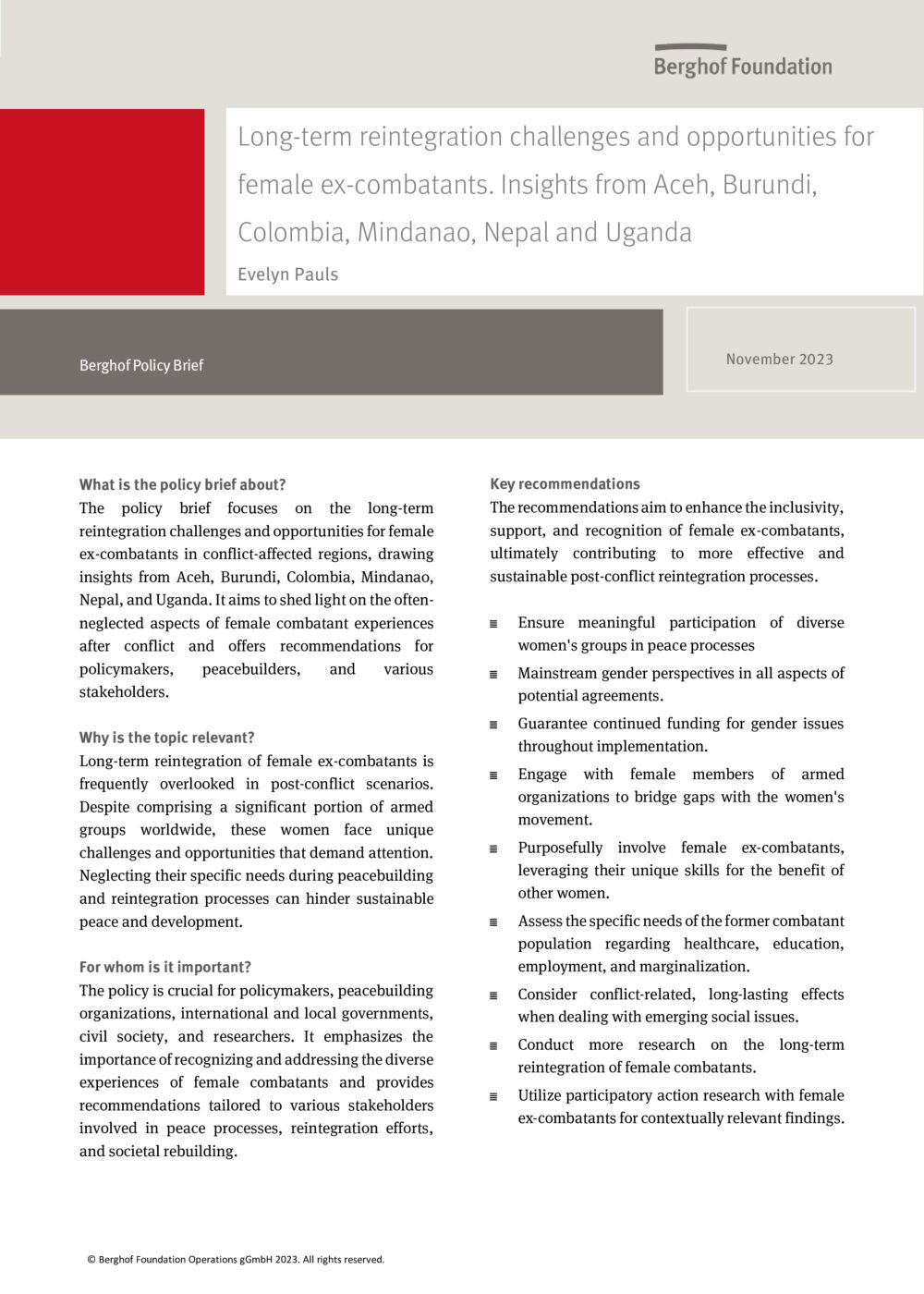
Long-term reintegration challenges and opportunities for female ex-combatantsInsights from Aceh, Burundi, Colombia, Mindanao, Nepal and Uganda
The policy brief analyses long-term reintegration challenges and opportunities for female ex-combatants. Drawing insights from working with female ex-combatants in Aceh, Burundi, Colombia, Mindanao, Nepal, and Uganda, it sheds light on the often neglected aspects of their experiences after conflicts end. It offers recommendations for policymakers, peacebuilders and many more on how to design sustainable post-conflict reintegration processes for female ex-combatants.
- Year2023
- Author(s)Evelyn Pauls
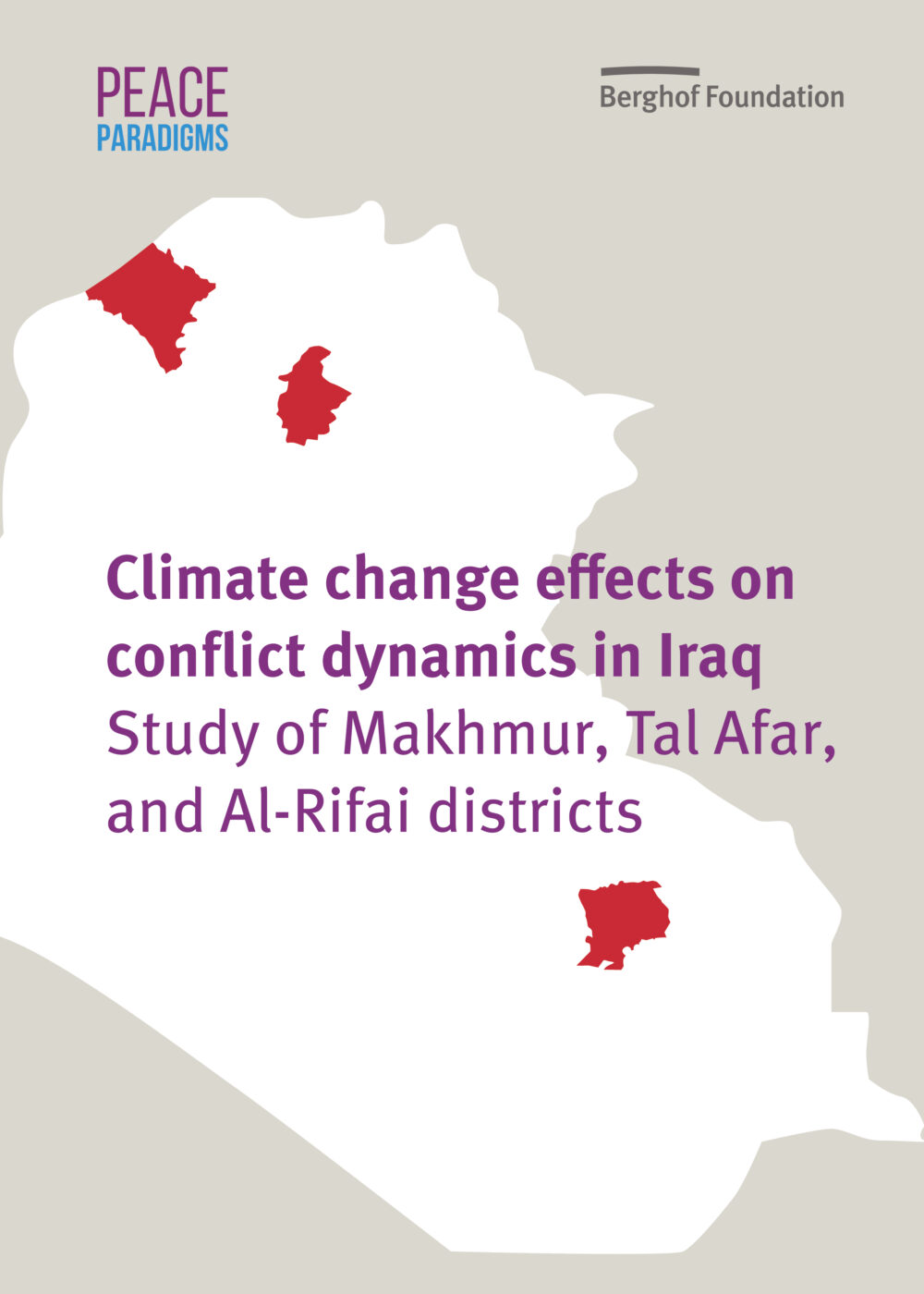
Climate change effects on conflict dynamics in IraqStudy of Makhmur, Tal Afar, and Al-Rifai districts
The negative effects of climate change and the security risks associated with it are beginning to register across Iraq. Over the past decade, the rise in extreme weather events, such as high temperatures, droughts, desertification, flooding, and sand and dust storms, has caused various severe consequences, including water scarcity, loss of economic livelihoods (particularly for those relying on the agricultural sector), climateinduced displacement and migration, and a rise in food insecurity.
- Year2023
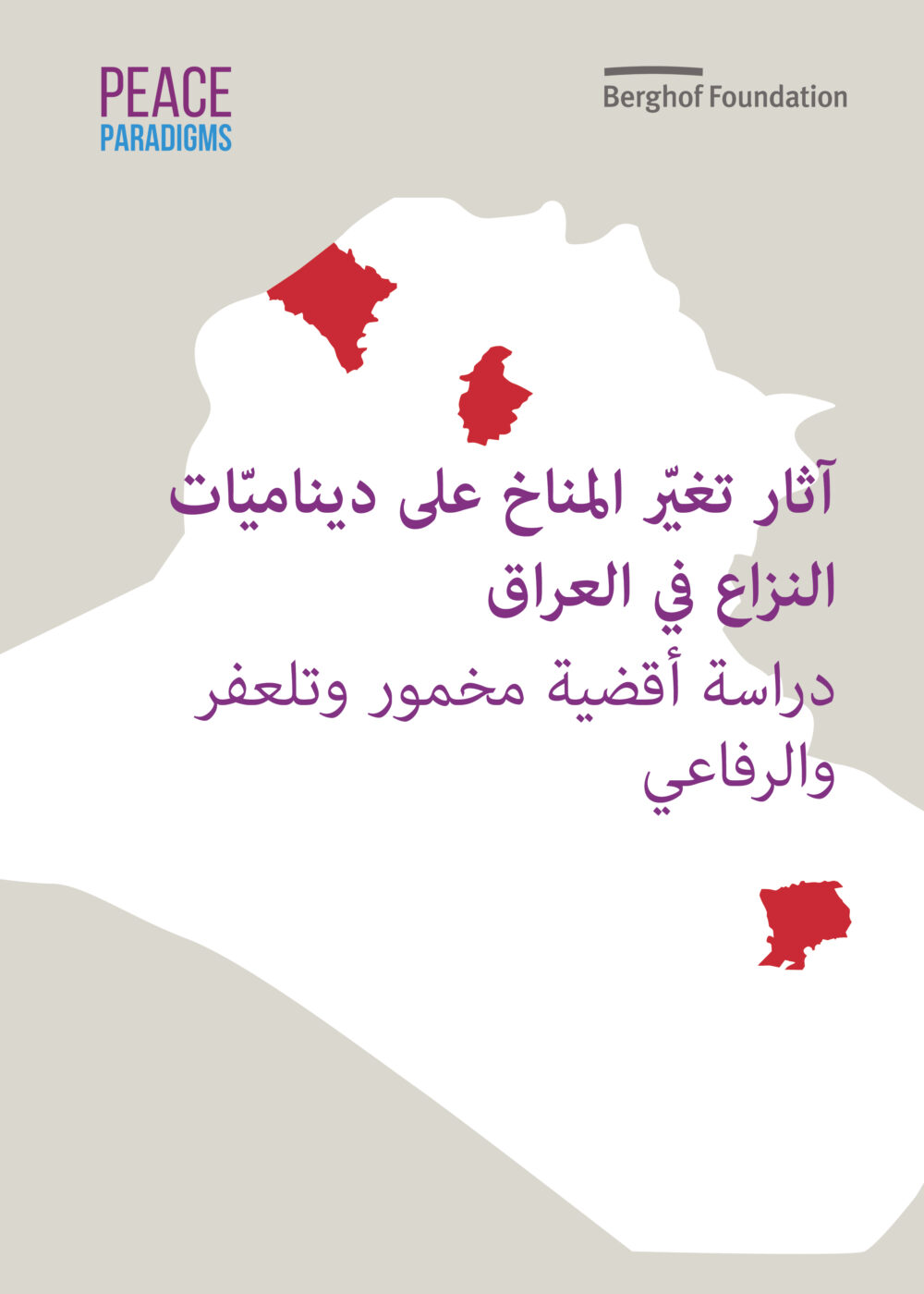
آثار تغيّّر المناخ على ديناميّات النزاع في العراقدراسة أقضية مخمور وتلعفر والرفاعي
بدأ العراق يشعر بوطأة تغيُّر المناخ وزيادة المخاطر الأمنيّة ذات الصلة. وكان لزيادة الظواهر الجويّة القصوى خلال العقد الماضي – بدءًا من درجات الحرارة المرتفعة والجفاف والتصحّر وصولًا إلى الفيضانات والعواصف الرمليّة والغباريّة - عواقب وخيمة عدّة، بما في ذلك ندرة المياه وفقدان سبل العيش الاقتصاديّة، (ولا سيّما بالنسبة إلى الأشخاص المعتمدين على القطاع الزراعي)، والنزوح والهجرة بسبب المناخ، وتزايد انعدام الأمن الغذائي. كما ازدادت قابليّة البلد على التأثّر بهذه العواقب بسبب القدرات المحدودة ونقص الهياكل والآليات التي يمكنها الاستجابة بشكل فعّال لآثار تغّير المناخ والتخفيف من حدّتها. فآثار تغيُّر المناخ أدَّت إلى تفاقم التحدّيات الكثيرة التي تواجهها البلاد، خصوصًا تلك المرتبطة بالنزاع الأخير مع ما يُسمّى بتنظيم الدولة الإسلاميّة (المعروف أيضًا باسم داعش)، فضلًا عن الاستبعاد السياسي وسوء الحوكمة.
- Year2023
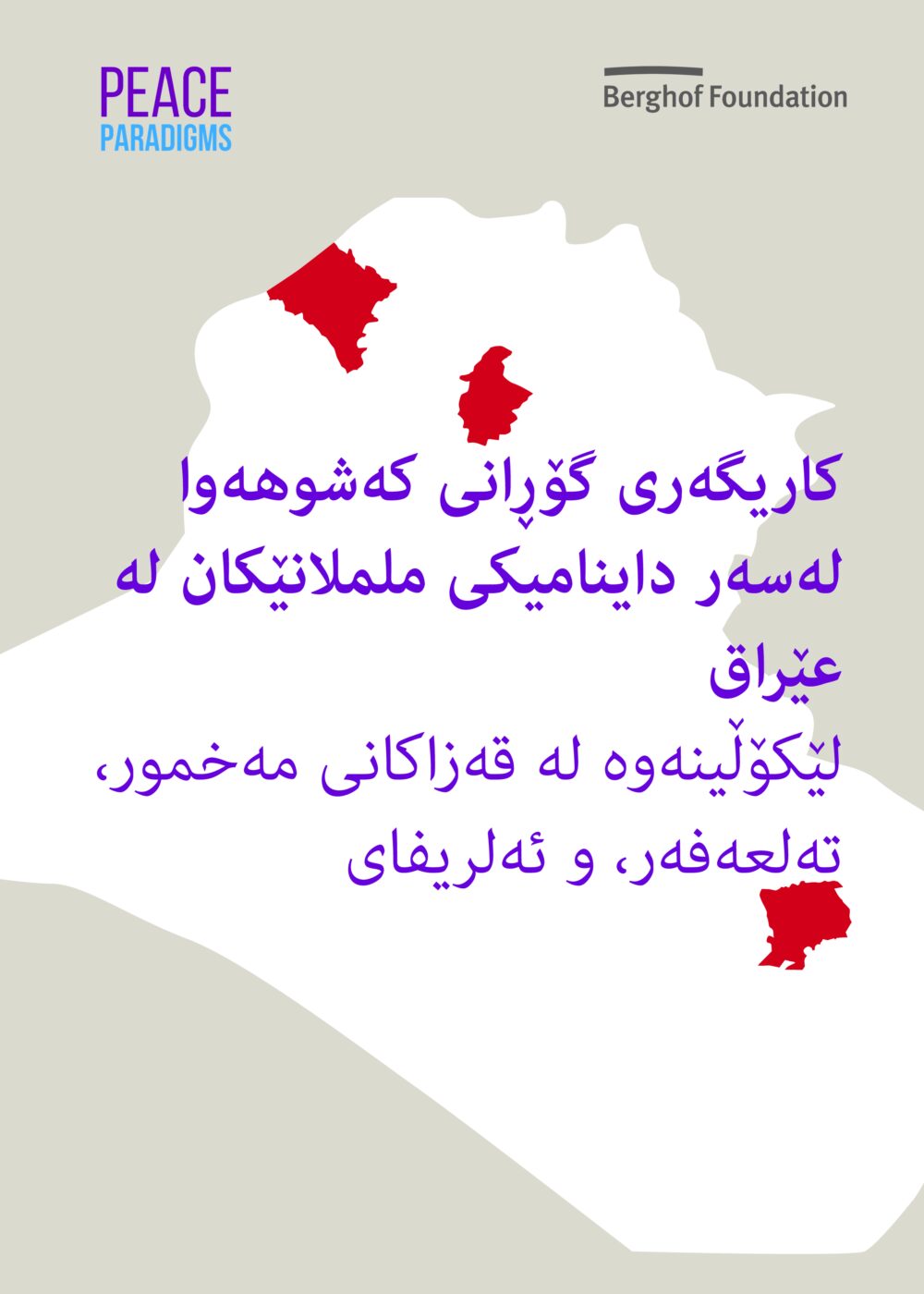
کاریگەری گۆڕانی کەشوهەوا لەسەر داینامیکی ململانێکان لە عێراقلێکۆڵینەوە لە قەزاکانی مەخمور، تەلعەفەر، و ئەلریفای
کاریگەرییە نەرێنییەکانی گۆڕانی کەشوهەوا و مەترسییە ئەمنییەکانی پەیوەست بەوەوە لە سەرانسەری عێراقدا دەستیان پێکردووە. لە ماوەی دەیەی ڕابردوودا، بەرزبوونەوەی ڕووداوە توندەکانی کەشوهەوا، وەک بەرزبوونەوەی پلەکانی گەرما، وشکەساڵی، بیابانبوون، لافاو، و زریانی خۆڵ و خۆڵ بارین، لێکەوتەی ترسناک و جۆراوجۆری لێکەوتەوە، لەوانە کەمی ئاو، لەدەستدانی بژێوی ئابووری (بەتایبەت بۆ ئەوانەی وابەستەی کەرتی کشتوکاڵین)، ئاوارەبوون و کۆچکردن بەهۆی کەشوهەوا، و زیادبوونی نائاسایشی خۆراک. لاوازی وڵات بەرامبەر بە ئەم کاریگەرییانە بەرزبووەتەوە بەهۆی سنووردارکردنی تواناكان و نەبوونی پێکهاتە و میکانیزمێک کە بتوانێت بە شێوەیەکی کاریگەر وەڵامی کاریگەرییەکانی گۆڕانی کەشوهەوا بداتەوە و کەم بکاتەوە.
- Year2023
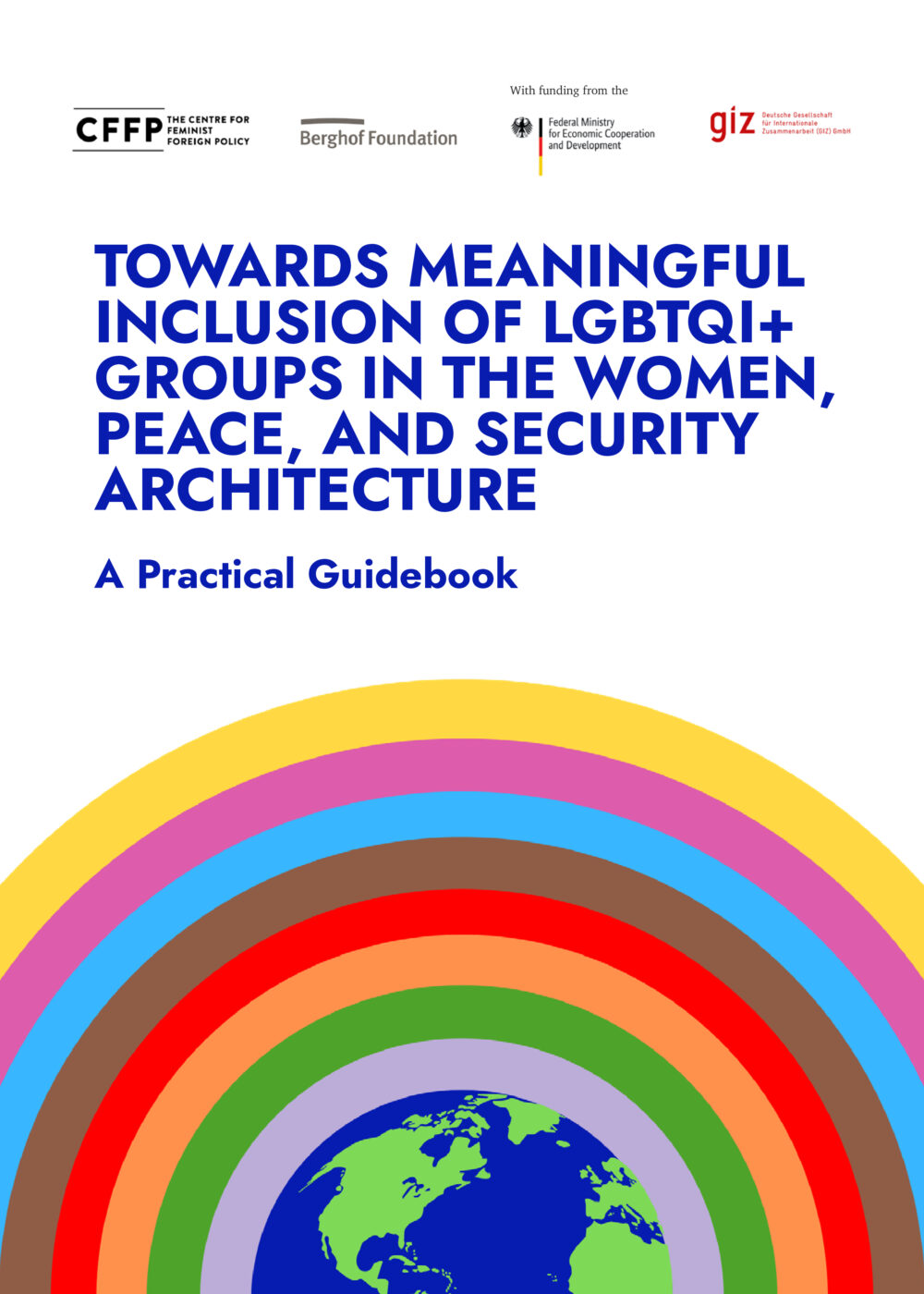
Towards meaningful inclusion of LGBTQI+ groups in the Women, Peace, and Security architectureA practical guidebook
In the 23rd year since the adoption of UN resolution 1325, governments, international organisations, and civil society groups worldwide are making efforts to integrate gender considerations into the Women, Peace, and Security (WPS) framework. However, the unique needs and perspectives of the LGBTQI+ community have often been overlooked.
In collaboration with CFFP, the Centre for Feminist Foreign Policy, we have created this guidebook to assist civil society representatives and policy practitioners in better acknowledging the lived experiences of LGBTQI+ individuals.
- Year2023
- Author(s)Liam Li, Nina Bernarding, Christine Seifert, Beatrix Austin
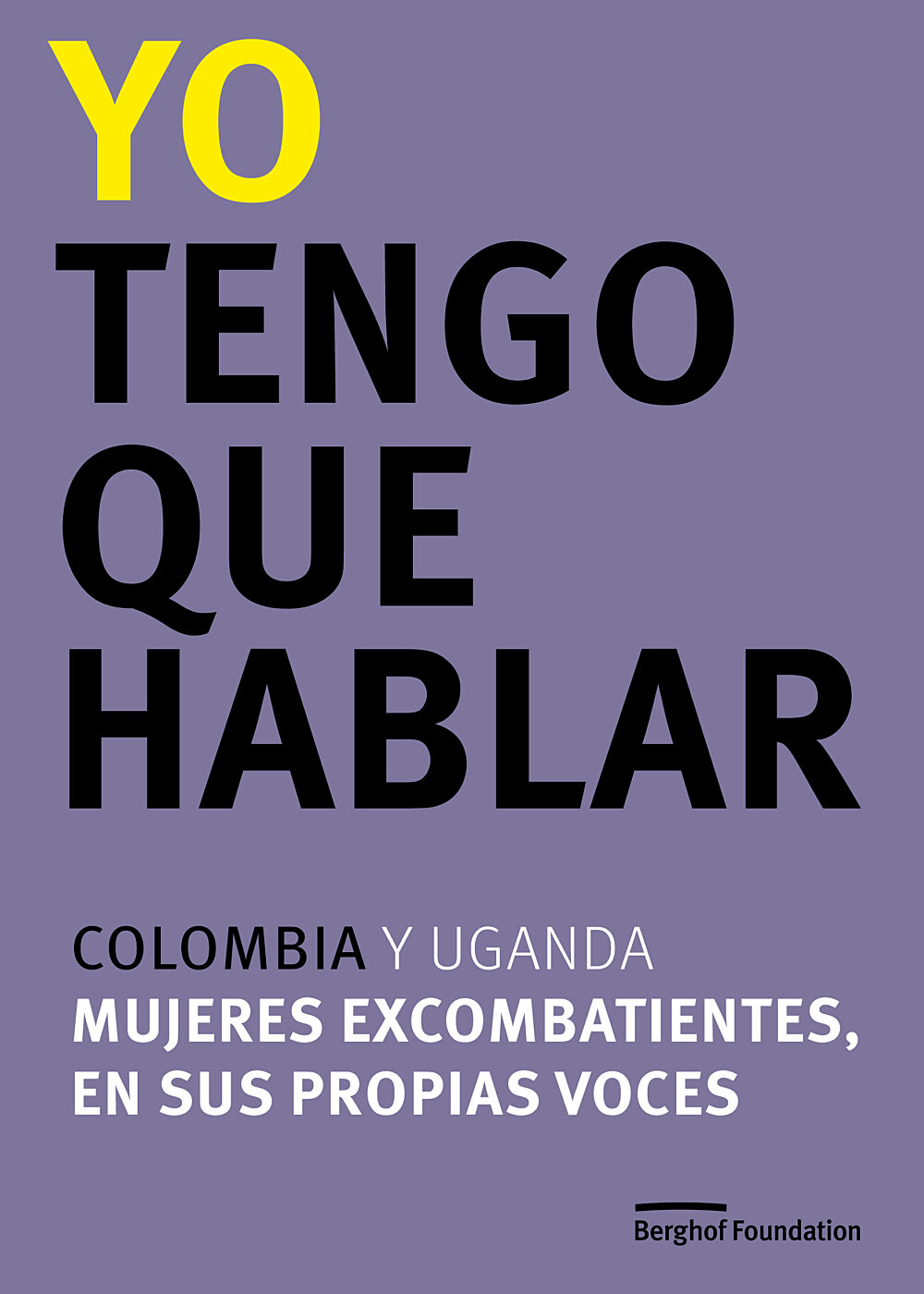
Yo Tengo Que Hablar: Colombia y UgandaMujeres Excombatientes, En Sus Propias Voces
Esta publicación busca amplificar algunas de las voces ocultas y olvidadas en el conflicto. Las historias de mujeres excombatientes de diversos orígenes políticos, religiosos, étnicos y nacionales muestran que las mujeres y sus experiencias de conflictos armados y sus secuelas deben tomarse en serio para construir una paz sostenible.
- Year2023
- Author(s)Beatrice Aciro, Grace Arach, Violeta Guetnamova, Isabelle Kawka
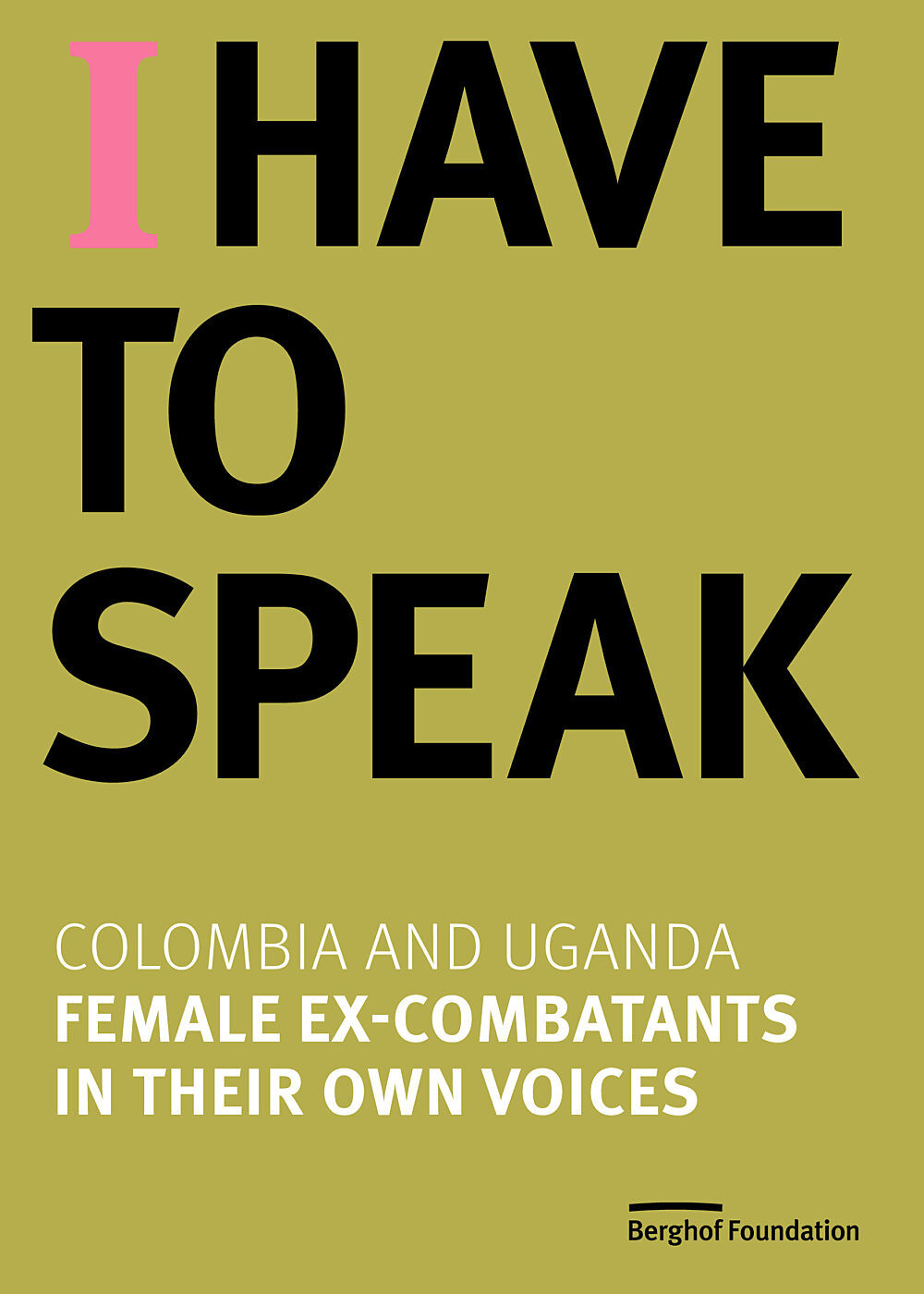
I Have To Speak: Colombia and UgandaFemale ex-combatants in their own voices
This booklet seeks to amplify some of the hidden and forgotten voices in conflict. The stories of female ex-combatants from diverse political, religious, ethnic and national backgrounds show that women and their experiences of armed conflict and its aftermath have to be taken seriously for building sustainable peace.
- Year2023
- Author(s)Beatrice Aciro, Grace Arach, Violeta Guetnamova, Isabelle Kawka
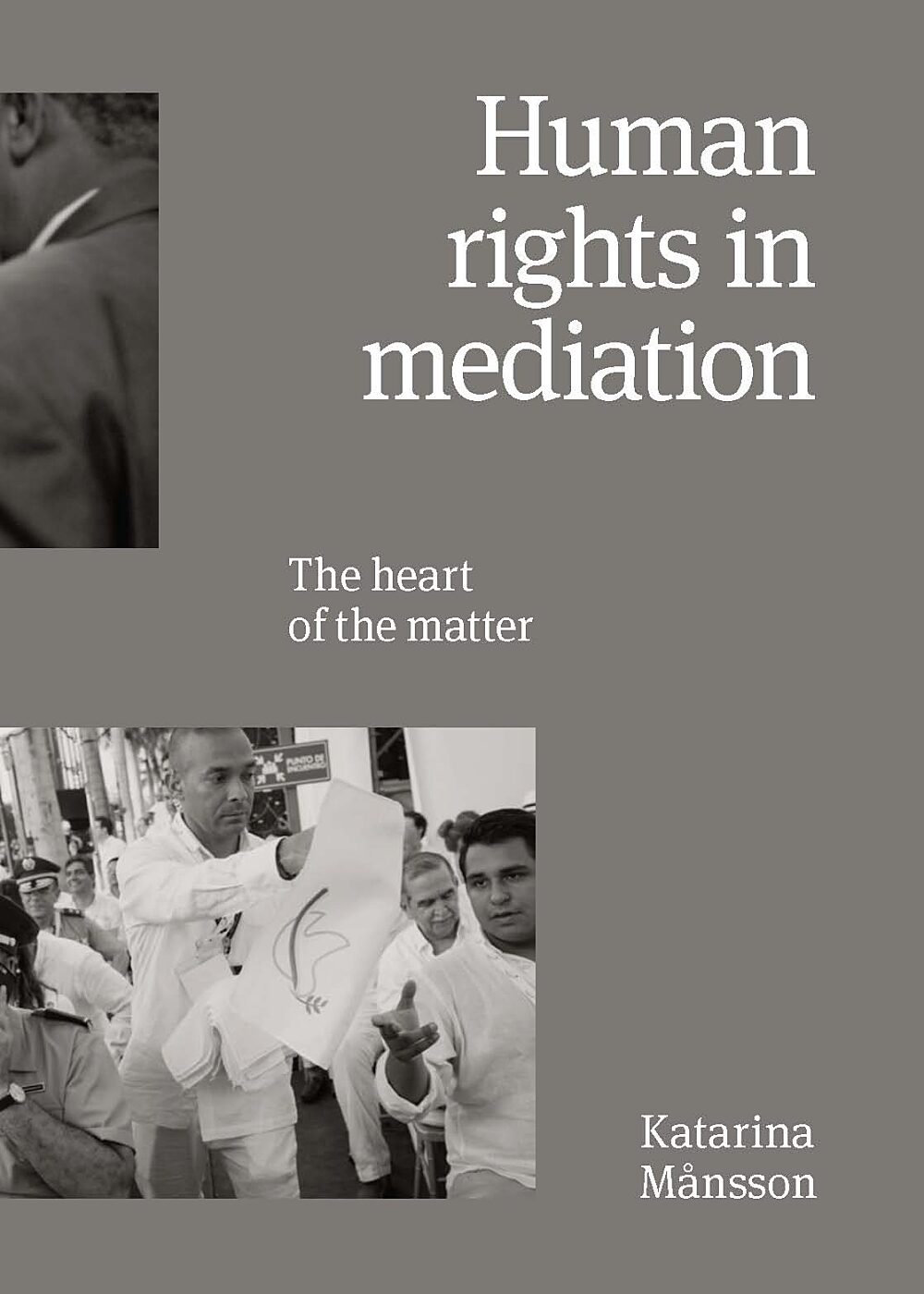
Human rights in mediationThe heart of the matter
In her book, Katarina Månsson examines the relationship between human rights and mediation by analysing past and present mediation processes, from the early beginnings of United Nation's mediation efforts to recent examples like the peace process in Colombia.
- Year2023
- Author(s)Katarina Månsson
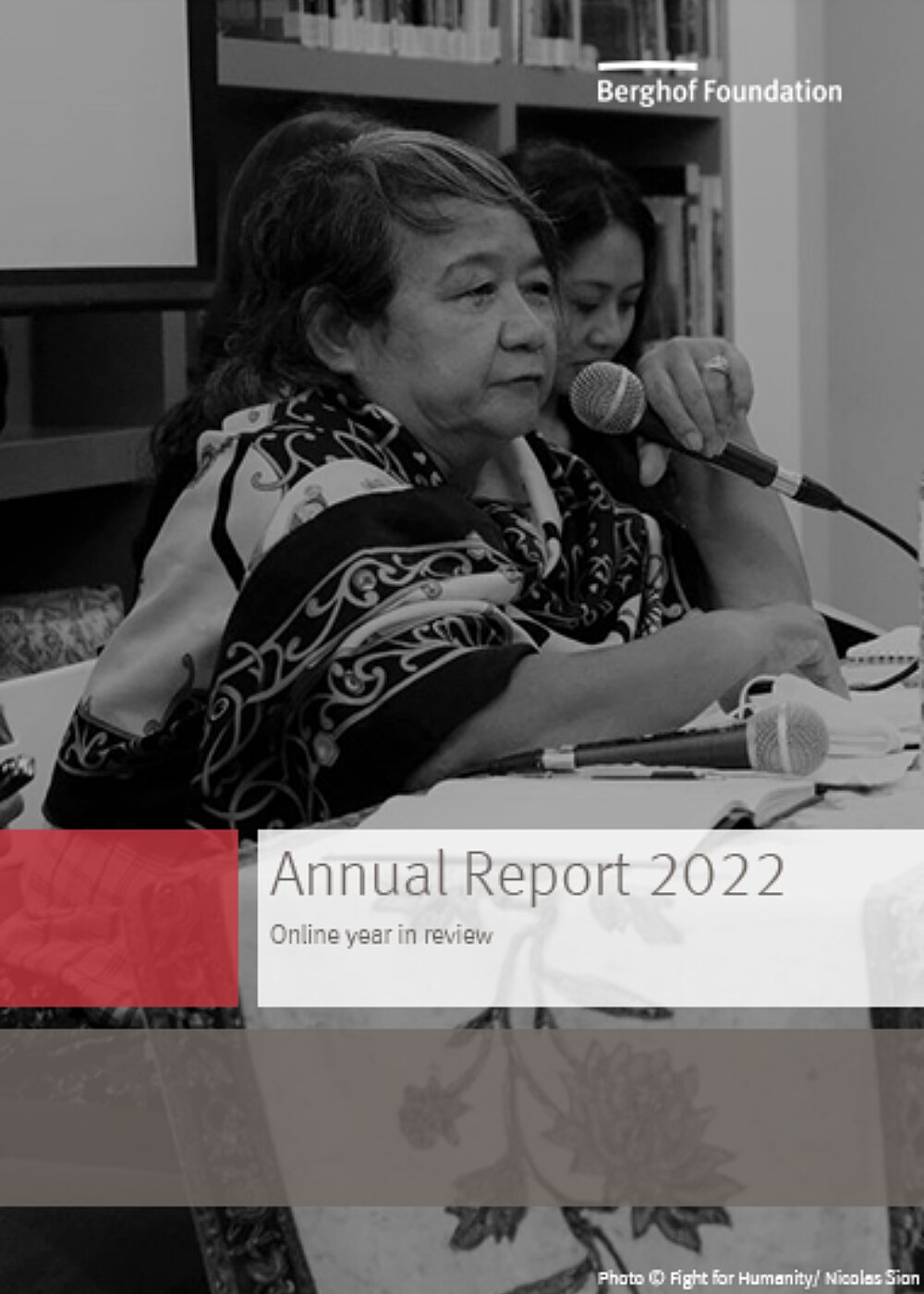
Berghof Foundation Annual Report 2022Online year in review
Our 2022 annual report gives an overview of our work around the world during the year as well as insights into our finances and funding.
- Year2023
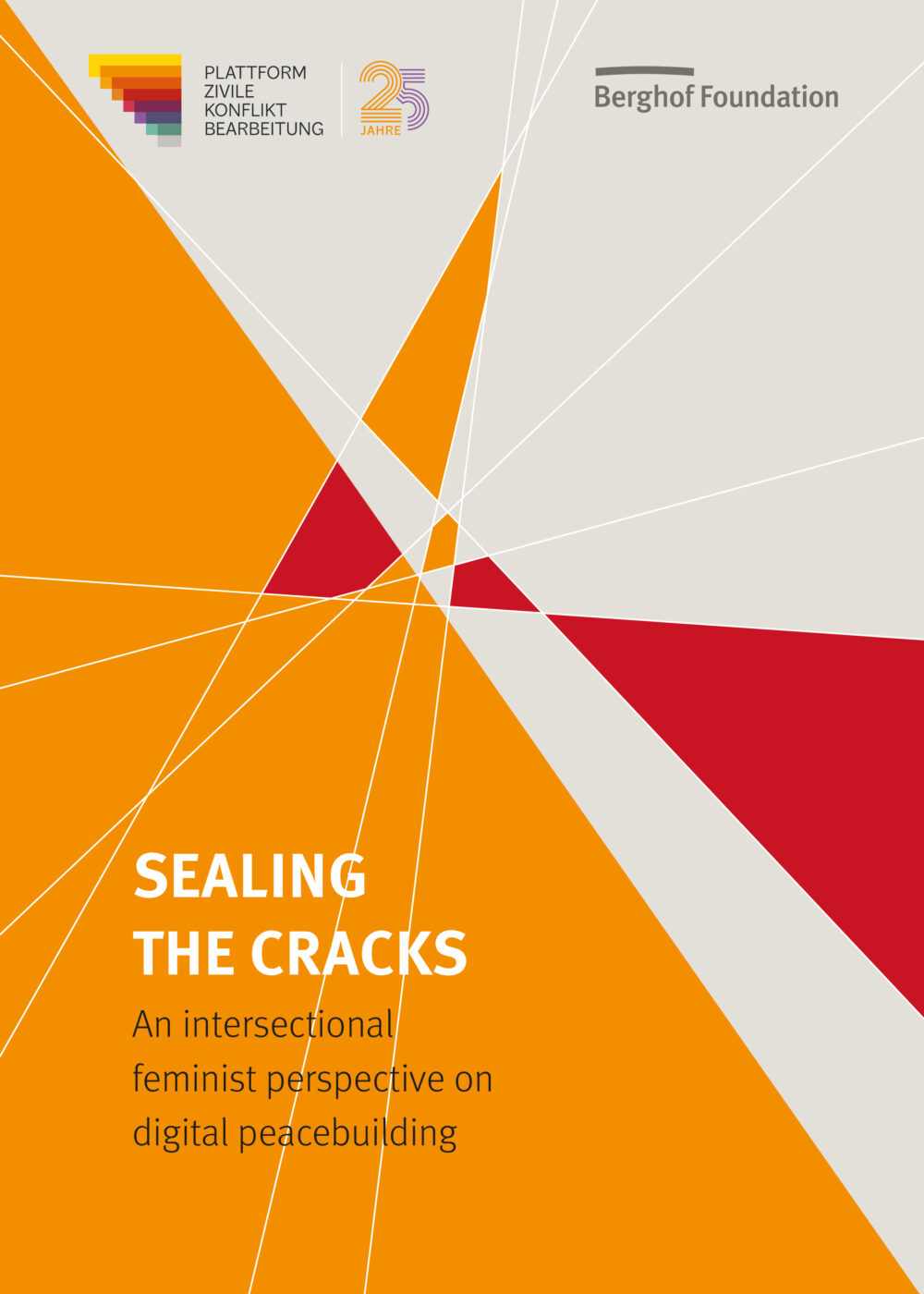
Sealing the cracksAn intersectional feminist perspective on digital peacebuilding
This paper fills a gap in existing literature and practice: it brings together expertise on intersectional feminist approaches to technology with intersectional feminist approaches to peacebuilding.
- Year2023
- Author(s)Krystel Tabet, Mira El Mawla, Claudia Meier, Helena Puig Larrauri, Rita Costa Cots